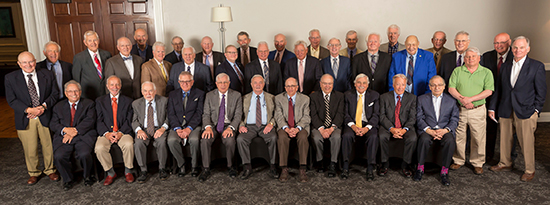
Nearly 40 lawyers from the Class of 1968 celebrate their 50-year milestone in the legal profession at a luncheon hosted by the State Bar of Wisconsin on May 7 in Delafield. Click on the photo to expand.
Visit the State Bar’s Facebook page for more photos of this event, or click here.
May 16, 2018 – 1968. In one year, the U.S. experienced the assassinations of Martin Luther King Jr. and Robert F. Kennedy, the Open Housing Marches in Milwaukee, escalating protests against the Vietnam War, riots at the Democratic National Convention in Chicago.
U.S. Olympic athletes raise their fists in Black Power salute on the medals podium at the Summer Olympics in Mexico City, humans orbit the moon, Yale University admits women, the first interracial kiss on U.S. national television was shown in Star Trek’s third season, and Richard Nixon defeated Vice President Humbert Humphrey for U.S. president.
It was a turbulent time – and the year nearly 250 lawyers were admitted to practice in Wisconsin.

The Class of 1968 stands for a round of applause.
1968 … and Beyond
In Madison, “we became accustomed to the acrid scent of tear gas on Bascom Hill, during repeated student anti-Vietnam war demonstrations,” Daniel Rinzel (U.W. 1968) said.
“In retrospect, it was an amazingly exciting and yet troubling time,” said Frank Daily. “There were times when it seemed that the rule of law and life as we knew it would disappear. But it was also a time of great opportunities to make a major difference in the lives of clients and our community.”
“The world seemed to be unravelling in 1968,” said retired Wisconsin Supreme Court Justice David Prosser (U.W. 1968).
The Vietnam War was of huge concern to the students.
Justice Prosser recalls seeing Martin Luther King Jr. speak in Madison when he was a 1L. “He made a tremendous impression on me,” Justice Prosser said. On April 4, 1968, he vividly recalls the announcement of King’s assassination. “It was a Thursday,” he said. “This had a great effect on students in the law school the next day. The aftermath of the assassination was shocking, especially to those who identified with his message or had seen Dr. King speak.”
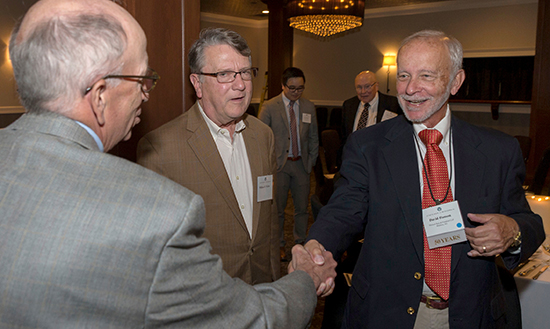
Class of 1968 colleagues David Hanson (right) of Madison greets Ron Todd of Cambridge. William White looks on.
A Zeal for Working in the Public Interest
The events of the year left many with a heightened concern for civil rights issues and a zeal for public service.
As a law student, Bert Liebmann (Harvard 1967) joined a student fact-finding mission in 1966, traveling to Vietnam and Taiwan.
Daily developed a strong and passionate commitment to providing free legal services to underserved areas of Milwaukee – something he still has today. “I am able to do it through the marvelous work of the Mobile Legal Clinic – which literally puts justice on wheels.”
Rinzel’s first job was with the Wisconsin Legislative Council in Madison, where he helped to research and write reports covering racial discrimination issues in housing, employment, education, and law enforcement. “It was a great experience,” Rinzel said.

Frank Daily, with his Labrador, Atticus – named after Atticus Finch – in October 2016.
Then, in 1969, he moved to Washington, D.C., where he joined the U.S. Department of Justice Civil Rights Division. “For the next 15 years, I worked on many civil rights cases, involving school desegregation, racial violence, and police misconduct,” he said. In 1980, he became chief counsel for the chief counsel for the Permanent Subcommittee on Investigations for the U.S. Senate.
“We conducted investigations on money laundering, international drug trafficking, organized crime, arms trafficking, and the security of U.S. embassies abroad,” Rinzel said.
Justice Prosser worked for a Congressional representative, served as a district attorney, ran and lost for the Assembly and for Congress. “In every case, I landed on my feet because I had a law degree,” he said. “What I learned in law school, help over the years from classmates, and my work in the profession were indispensable in helping me succeed in the jobs I had.”
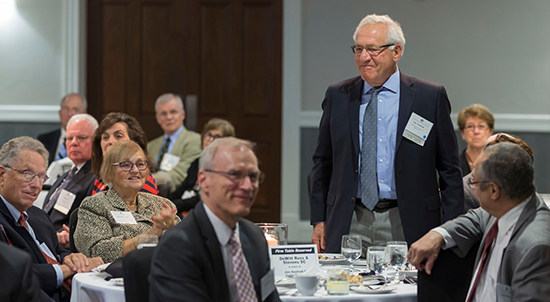
Jon Axelrod of Madison stands as Chief Justice Roggensack calls the names of lawyers from the Class of 1968.
Visit the State Bar’s Facebook page for more photos of this event, or click here.
Improving the Justice System
Milwaukee County Circuit Court Judge Patricia McMahon (Emory 1968) was also deeply affected by the events of the time while a law student. As a result, she focused the early part of her professional career on civil rights and the legal needs of low-income people. She worked as executive director of Legal Action Wisconsin, and on the boards of the State Public Defender, Wisconsin Interest on Lawyers Trust Accounts Foundation (IOLTA), and the Migrant Legal Action Program.
Then, as a Milwaukee County Circuit Court judge for 25 years, she presided over cases involving domestic violence, sexual assault, gun violence, as well as other civil and criminal cases.

Judge Patricia McMahon, who retired from the Milwaukee County Circuit Court in 2010, poses for a photo during a recent trip to Italy.
She was active in improving the administration of the county’s judicial system, including developing and maintaining Speedy Trial, Domestic Violence, and Business courts.
“I presided over thousands of cases,” Judge McMahon said. “While every case was important, the highlight of my career was presiding over cases that presented complex legal issues (such as Chevron, WEPCO, Migliorino) or complex case management concerns (double jury trial, multiple victims) or both.”
Access to justice and the civil rights issues remain of important to Daily. “I remain active today in groups such as the Southern Poverty Law Center and the Equal Justice Initiative, groups that fight for justice and fairness in these troubled times that often remind me of the political and social turmoil of the early years of my practice,” he said.
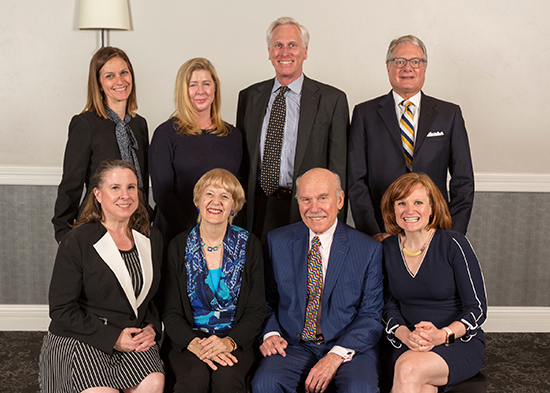
Honoree Ed Heiser Jr. (front, second from right) and wife Doris are joined by Husch Blackwell LLP members Marci Kawski, Lisa Lawless, Bruce Arnold, Ann Maher, Ken Nowakowski, and Tami O’Brien.
Prosecution and Government Accountability
For Doug Haag (U.W. 1968), his experience in the Army before law school shaped his views of the events of the time. “I resented the violence of the anti-war movement,” he said. “I continue to feel that way.”
Haag, in fact, became assistant attorney general in Wisconsin – after working as an attorney for the U.S. Atomic Energy Commission. He spent 29 years as a criminal prosecutor. He was one of the state prosecutors who handled the Sterling Hall bombing. “As a special prosecutor, I was privileged to have cases in the majority of Wisconsin’s 72 counties.”
After retiring from the Department of Justice, Haag worked part time as a prosecutor/investigator for the Government Accountability Board (formerly the Ethics Board). “It was a very rewarding professional experience working with some great cohorts, doing important work,” he said.
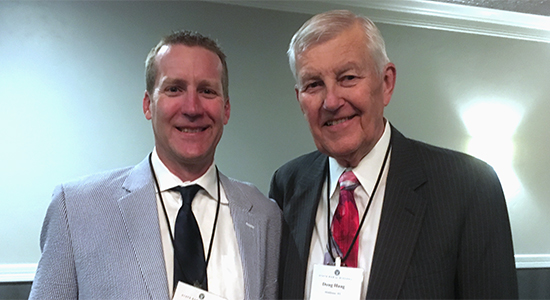
Doug Haag of Middleton was one of the state prosecutors who handled the Sterling Hall bombing. His son Eric, also a lawyer, joined his father for the 50-year celebration on May 7.
‘If I Knew Then … ’
It took many years to develop an appreciation of the broader history of the time, according to Liebmann. You gain a better perspective looking back, some say, than when you’re in the midst of things.
“I actually didn’t appreciate the Beatles for the first 10 years or so, as America was going crazy over them,” Liebmann said. “My political view at the time was fixated on prevention of world domination by the communist movement.”
Busy then with the daily tasks of helping clients and building a practice in Green Bay, Liebmann held a very conservative world view, which, he says, caused him to “dismiss, too easily, the pain and turmoil that the nation was going through.”
“I wish I had known then what I know now, and I might have had a better appreciation of the movement of the times,” Liebmann said.
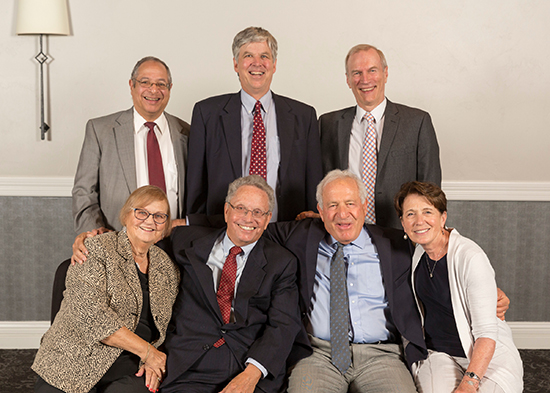
Honorees Peter Peshek (front left) and Jon Axelrod and spouses Sharon and Susan are joined by DeWitt Ross & Stevens S.C. firm members Justice Louis Butler, Timm Speerschneider, and Ron Ragatz.
Life-defining Experiences
As a law student in 1967 and 1968, Liebmann helped in a case that left a lasting impression on him throughout his law career, working as second chair with his (future) senior partner, Alexander Grant (later a Brown County Circuit Court judge). Liebmann and Grant defended a five-count murder case. It was a trial that lasted three weeks – the longest at the time in Green Bay.
“At the time, the U.S. Supreme Court was defining search and seizure rights, and related constitutional rights, of accused persons. We did a lot of briefing on those issues.” The case, tried more than five years after the deaths, involved sanity as a defense. “It certainly was a defining experience for my career.”
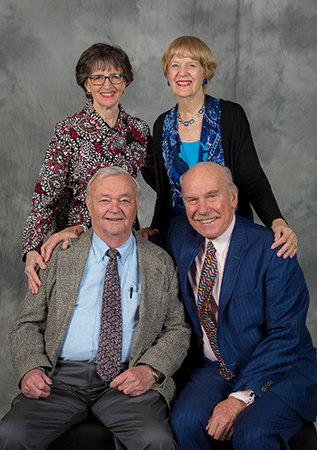
Daniel Grable of Oconomowoc (left) and Ed Heiser Jr. of Milwaukee are joined by Gail Grable and Doris Heiser.
Visit the State Bar’s Facebook page for more photos of this event, or click here.
A highlight for Daily came at the conclusion of his trial career, with an ending “which I could not have envisioned when I began practicing law.” It was Harper Lee’s Atticus Finch, the lawyer in To Kill a Mockingbird, that served as an inspiration to pursue law. “I even have a black Labrador retriever named Atticus,” he says.
Shannon Green is communications writer for the State Bar of Wisconsin, Madison. She can be reached by email or by phone at (608) 250-6135.
During his career – entirely with Quarles & Brady LLP in Milwaukee – Daily successfully tried 15 cases in Alabama, including his last one. “I won my very last case, a wrongful death action that I defended in Harper Lee’s home town of Monroeville, Alabama – the place where the movie was filmed.”
Liebmann is proud of the role he played in establishing the State Bar’s General Practice Section (now part of the Solo/Small Firm and General Practice Section) in the early 1980s. “There was a call for a broad-based section to meet the needs of general practice attorneys. I was very happy to bring the petition to the Bar leadership,” he said. The section grew to become one of the largest at the time.
Out of the section’s leadership came the idea for the Attorney’s Desk Reference, now it its sixth edition from State Bar of Wisconsin PINNACLE®, as a joint venture between the State Bar and the section. Liebmann contributed as an author of the first edition, published in 1986.
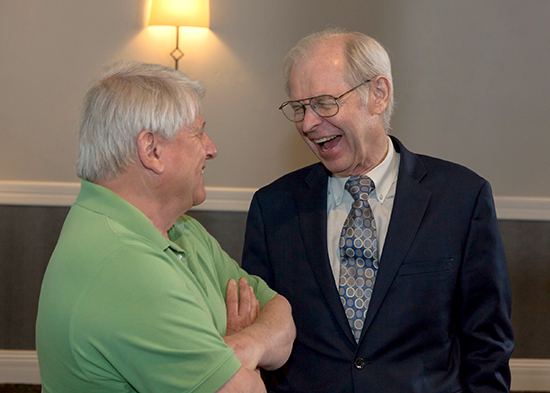
Thomas Kubasta of Wautoma and Justice David Prosser, both 50-year honorees, share a laugh after the luncheon.
Some Things Change, Some Stay the Same
The biggest change since 1968, Haag says, is the difference in how lawyers handle advertising, and – of course – in the use of computers in research and practice.
Liebmann agrees that the internet has effected the largest change in the profession – and perhaps a subsequent decline in personal professional relationships. “And some would add – a decline in civility,” he says. “It’s much easier to think harshly of folks on the other side of an issue when more and more communication is handled by email and secondhand messaging.”
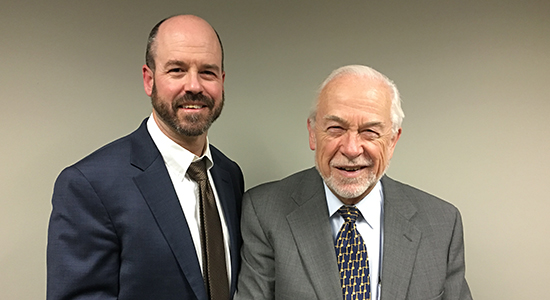
Bert Liebmann poses with his son and law partner, Bret Liebmann. They share a practice in Green Bay.
Judge McMahon believes that the issue of access to justice has not improved since she graduated from law school. “Unfortunately, the situation is worse,” she said
While the creation of the Legal Services Corporation promised increased access to legal services in civil matters, the funds have decreased, and it continues to face threats of defunding, she said. And other efforts, such as Wisconsin Trust Account Foundation (WISTAF) and pro bono participation – while significant – fail to meet the needs. “Efforts to recognize a right to counsel ‘Civil Gideon’ have fallen on deaf ears.”
On the criminal side, efforts to provide access to justice are “equally dire,” she said, with rates of pay for private attorneys who represent low-income defendants the lowest in the country.
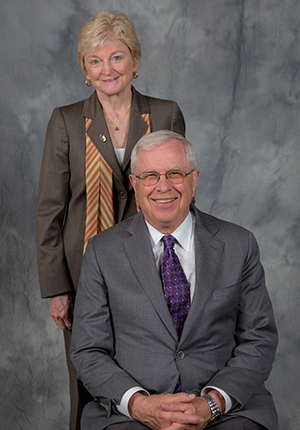
Chief Justice Roggensack with Daniel Rinzel of Mount Vernon, Virginia, who is active in State Bar leadership and in the Nonresident Lawyers Division.
The Key to Harmony
Work-life balance was an issue over the years, as it still is today.
“I think the greatest challenge for me as a lawyer was the struggle to find a balance between responsibilities to clients and the harsh relentless demands of a national trial practice and the obligations, duties and commitment to family, faith, and community,” Daily said.
Liebmann practices now with this son Bret Liebmann (Marquette 2008). “I’m greatly enjoying our newest latest venture.” The key to a harmonious working relationship, he says, is practicing in different areas. He now handles small business organization, estate planning, and transactional work.
“And I’m blessed to be able to rely on Bret to handle the litigation and other related areas of our clients’ legal needs,” he said. “A younger lawyer who is engaged in disputatious matters better serves his clients when he is affiliated with someone who doesn’t work in litigation.”
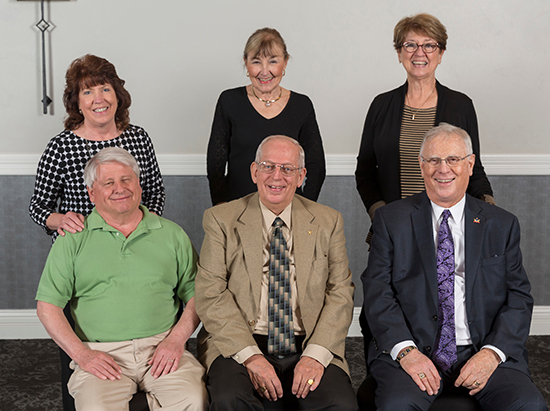
Longtime friends Thomas Kubasta of Wautoma, Claude Held II of Watertown, and James Olson of Beaver Dam capture a memory with their wives.
Fiercely Proud
All along, Rinzel maintained connections with his roots in Wisconsin – active with the Nonresident Lawyers Division, the State Bar Board of Governors, and various committees. “I love the state and the lawyers in Wisconsin,” Rinzel said.
“I remain proud to be a lawyer, and fiercely proud of the legal profession and its increasingly critical role as the cornerstone of a free society,” Daily said.
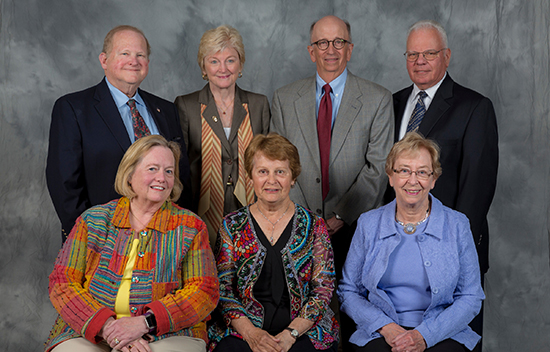
50-year honorees (standing, from left) Jerry Slater of Beulah, Michigan, Ronald Todd of Cambridge, and Colin Pietz of Wausau are joined by Chief Justice Roggensack and Agnes Slater, Mary Todd, and Lois Pietz.
Visit the State Bar’s Facebook page for more photos of this event, or click here.
